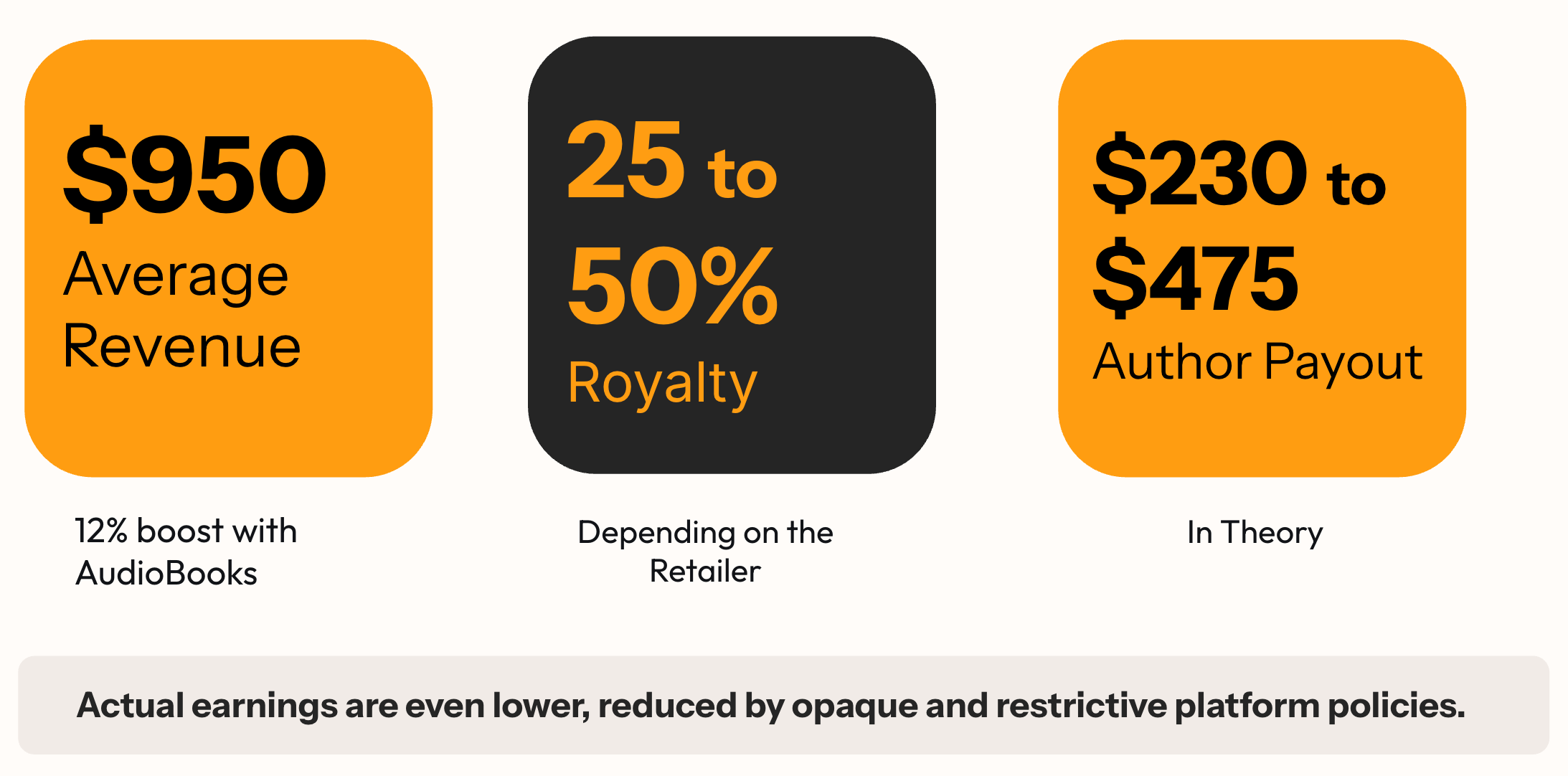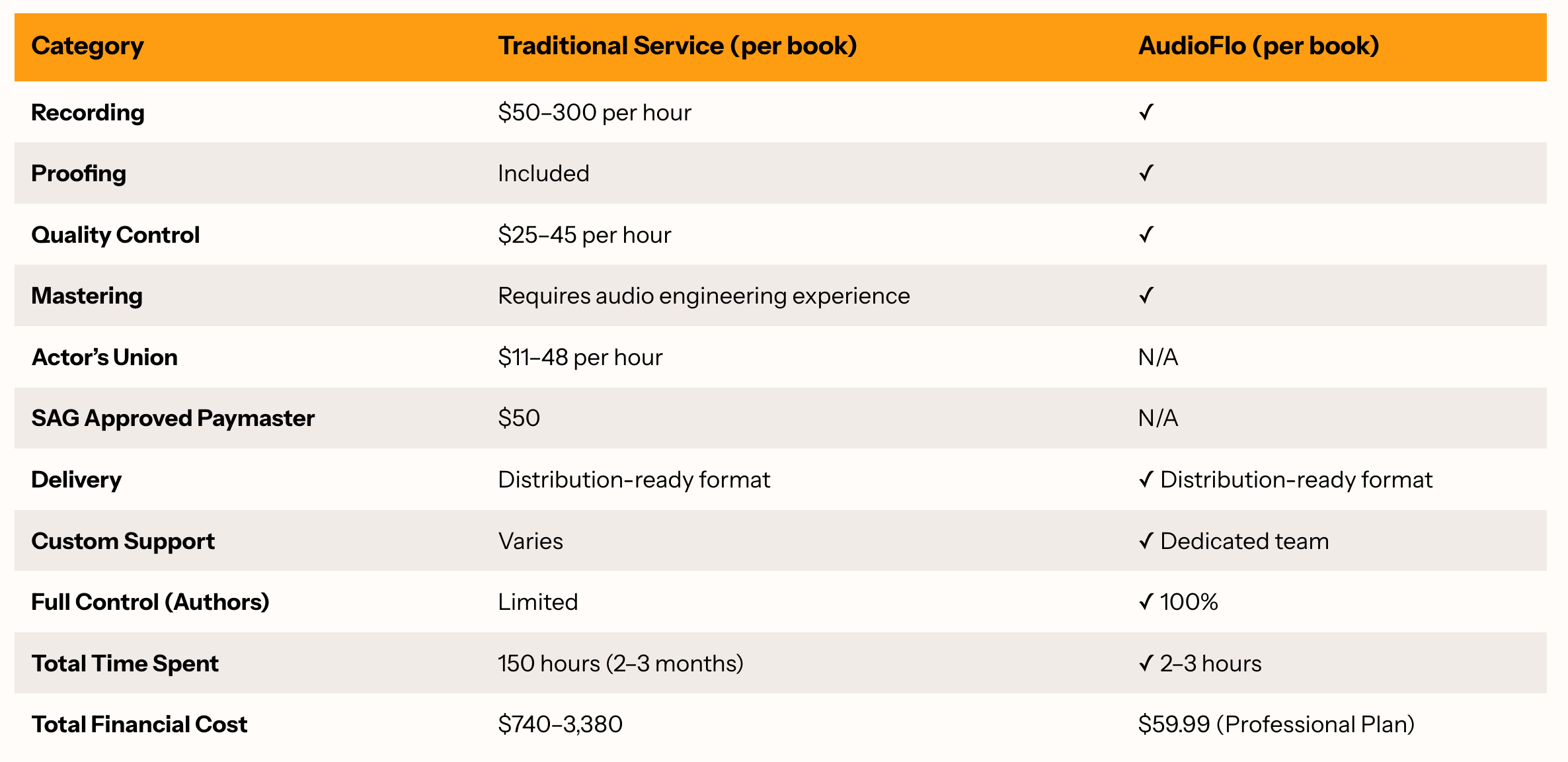Chapter Outline
- 1. Market Revenue Analysis - Understanding audiobook revenue potential for indie authors
- 2. Product Offering & Pricing - What value we bring, and Credit system
- 3. Competitive Analysis - How AudioFlo differentiates from existing solutions
- 4. Go-to-Market Strategy - Customer acquisition through targeted channels
- 5. Legal and Ethics - Copyright protection, privacy compliance, and ethical AI practices
- 6. Liability Insurance - Professional coverage for content platform operations
1. Audiobook Revenue Analysis
When I started digging into the numbers, I needed to understand what indie authors actually make from audiobooks. After analyzing industry data and talking with dozens of authors, I discovered a sobering reality about audiobook revenues:

Figure 1: Average lifetime revenue from a self-published audiobook
2. Product Offering
My Approach: Focus on Authors, Not Technology
Early on, I made a crucial decision: I wouldn't try to build yet another AI voice model. The tech giants are already pouring billions into that race. Instead, I focused on what authors actually need: an end-to-end platform that brings together the best voices from multiple providers. Think of it like Spotify for AI voices: I partner with the best technology companies and give authors one simple place to access everything.
I recognized that authors prioritize practical outcomes over technical specifications. While the industry focuses on novel transformer architectures and KV-cache optimizations presented at conferences like ICML, authors simply need immediate access to professional-grade narration capabilities. AudioFlo abstracts the underlying technical complexity, empowering authors to focus on their core mission: transforming written narratives into compelling audio experiences that resonate with listeners.
Credit System
I implemented a simple credit system: purchase credits either through a monthly subscription plan or one-shot transcation, then use them across all our studio-grade voices. Each voice consumes credits at different rates based on its technology costs, but all deliver professional quality. This transparent pricing lets authors access our entire voice library while controlling their budget.
5M credits provides sufficient capacity to produce an 8-hour audiobook, equivalent to approximately 300 pages of written content
Figure 2: AudioFlo pricing plans - transaction-based and subscription options
What excites me most about AudioFlo is how it changes the entire game for authors. Instead of waiting months and spending their kids' college funds, authors can now create professional audiobooks in just hours. I've managed to make it 95% cheaper than traditional methods, not by cutting corners, but by leveraging AI efficiently. And here's what authors love most: they stay in complete control. They pick their narrator's voice, adjust the pacing, and can even make changes without starting over.
Let me show you the difference between the old way and what I've built:

Table 1: Traditional audiobook production vs. AudioFlo's streamlined approach
The comparison above really shows why authors were pulling their hair out. Traditional production is a maze of hidden costs and complications. You find a great narrator, then discover they're union and that's an extra $300. Customer support and Audio quality? That depends entirely on whether your narrator is a seasoned pro or someone juggling five other projects. Even processing payments comes with transaction fees that nobody mentions upfront. I've eliminated all of this nonsense with AudioFlo. Authors upload their manuscript, pick a voice they love, and get their audiobook the same day. One price, no surprises, no middlemen. It's not just simpler. It's how audiobook production should have always worked.
3. Competitive Analysis
When I researched the competition, I found something interesting. Most big players treat audiobooks as an afterthought: Authors have to publish via their platforms first before being able even to start the production proces. Here's what I discovered about each competitor and why authors were frustrated:

- ✓ I give authors studio-quality voices without the studio prices
- ✓ Authors own their audiobooks completely - publish wherever they want
- ✓ I've made it affordable enough that authors actually profit
- ✓ Everything is designed specifically for audiobook creation, not generic TTS
4. Go-to-Market Strategy
I spent months figuring out where indie authors actually hang out and look for help. Instead of spray-and-pray marketing, I'm focusing on the specific places where authors are already asking about audiobook solutions:

Search Marketing
Target high-intent keywords like "audiobook production" and "self-publishing audio"

Social Media
Reach self-publishing communities on Facebook and Instagram with targeted content

Community Engagement
Connect with r/selfpublishing and r/writing communities for authentic engagement

Author Forums
Engage on WritingForums.com where authors seek publishing advice and solutions

Industry Resources
Partner with WidefortheWin.com to reach experienced indie authors

Social Media
Connect with experienced indie authors through curated social media promotions and author features.
📚 Want to dive deeper into the marketing strategy?
Check out Chapter 8: Marketing & Sales where I share detailed distribution channels, campaign strategies, and the exact playbook I'm using to reach authors at scale.
5. Legal and Ethics
Building an AI-powered platform comes with real responsibilities. From day one, I knew AudioFlo had to be built on a foundation of trust, respect for creators' rights, and ethical AI use. Here's how I'm addressing these critical areas:
Copyright Protection
I take copyright seriously. Every piece of content processed through AudioFlo remains 100% owned by the author. We don't train our AI models on user content, we don't store manuscripts beyond the production process, and we never claim any rights to the audiobooks created. I've also built in safeguards to prevent pirated content from being processed. Authors must verify ownership before production begins, and our terms of service clearly state that users are responsible for having the rights to any content they upload.
We're also in the process of registering for DMCA Safe Harbor protection in the United States. This isn't just about protecting AudioFlo from liability. It's about creating a trusted ecosystem where authors know their rights are protected and any copyright concerns will be handled swiftly and professionally. The DMCA registration will provide clear procedures for addressing copyright claims while ensuring legitimate authors can create their audiobooks without unnecessary friction.
Privacy Compliance
Privacy isn't just about following regulations like GDPR and CCPA (though we do). It's about respecting authors' creative work. I've implemented end-to-end encryption for all manuscript uploads, automatic deletion of source files after processing, and zero third-party data sharing without explicit consent. Authors can request complete data deletion at any time, and I maintain transparent logs of exactly what data we collect and why. I don't sell author data, period. The business model is selling audiobook production services, not harvesting data.
Ethical AI Use
The elephant in the room with AI voices is the impact on human narrators. I'm not trying to replace professional narrators. Instead, AudioFlo serves authors who could never afford traditional narration in the first place. We're expanding the market, not cannibalizing it. I've also made conscious choices about voice selection: all voices in our library come from providers who have properly licensed and compensated their voice actors. We refuse to use cloned voices without consent, and we're transparent about which voices are AI-generated. Authors can clearly label their audiobooks as AI-narrated, maintaining honesty with listeners.
6. Liability Insurance
Running a platform that handles creative content requires serious risk management. I've secured comprehensive liability insurance that covers everything from errors and omissions to cyber liability and intellectual property disputes. This isn't about expecting problems. It's about being prepared if they arise.
Authors need to know that AudioFlo will be here tomorrow, next year, and beyond. Having proper insurance coverage means that even in worst-case scenarios, we can continue operating and supporting our users. It's one of those unglamorous but crucial decisions that separates a real business from a side project. When authors trust us with their creative work, they deserve a company that has done the homework to protect both them and itself.